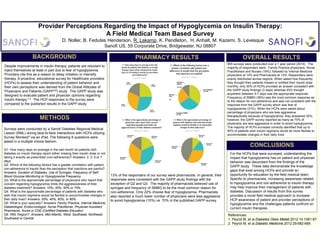
HCP Survey Reveals Knowledge Gaps About Impact of Hypoglycemia
- 1. Provider Perceptions Regarding the Impact of Hypoglycemia on Insulin Therapy: A Field Medical Team Based Survey D. Noller, B. Fedutes Henderson, R. Lakamp, K. Pendleton, H. Anhalt, M. Kazemi, S. Levesque Sanofi US, 55 Corporate Drive, Bridgewater, NJ 08807 CONCLUSIONS For the HCPs that were surveyed, understanding the impact that hypoglycemia has on patient and physician behavior was discordant from the findings of the GAPP study. These data demonstrate the knowledge gaps that exist among HCPs and provide an opportunity for education by the field medical team. Specific to pharmacists, increasing awareness related to hypoglycemia and non-adherence to insulin therapy may help improve their management of patients with diabetes. Discussion of results from this survey provides a novel field medical approach to increase HCP awareness of patient and provider perceptions of hypoglycemia and the challenges patients confront on current insulin therapies. BACKGROUND Despite improvements in insulin therapy, patients are reluctant to inject themselves at least in part due to fear of hypoglycemia. Providers cite this as a reason to delay initiation or intensify therapy. A proactive, educational survey for Healthcare providers (HCPs) to assess their understanding of patient behavior and their own perceptions was derived from the Global Attitudes of Physicians and Patients (GAPPTM) study. The GAPP study was designed to evaluate patient and physician opinions regarding insulin therapy.1-2 The HCP responses to the survey were compared to the published results in the GAPP study. OVERALL RESULTS METHODS Surveys were conducted by a Sanofi Diabetes Regional Medical Liaison (RML) during face-to-face interactions with HCPs utilizing Survey Monkey® via an iPad. The following 6 questions were asked in a multiple choice fashion. Q1: How many days on average in the last month do patients with diabetes on insulin therapy report either missing their insulin dose or not taking it exactly as prescribed (non-adherence)? Answers: 2, 3, 5 or 7 days Q2: Which of the following factors has a greater correlation with patient non-adherence to insulin than the perception that injections are painful? Answers: Duration of Diabetes, Use of Syringes, Frequency of Self- Blood Glucose Monitoring or Hypoglycemia Frequency Q3: What is the approximate percentage of physicians who report that concern regarding hypoglycemia limits the aggressiveness of their diabetes treatment? Answers: 10%, 30%, 50% or 70% Q4: What is the approximate percentage of patients with diabetes who wish that insulin regimens would be flexible to accommodate changes in their daily lives? Answers: 20%, 40%, 60%, or 80% Q5: What is your specialty? Answers: Family Practice, Internal Medicine, Diabetologist, Endocrinologist, Nurse Practitioner, Physician Assistant, Pharmacist, Nurse or CDE (Certified Diabetes Educator) Q6: RML Region? Answers: Mid-Atlantic, West, Southeast, Northeast, Southwest or Central 855 surveys were conducted over a 1 year period (2014). The majority of responders were: Family Practice physicians, Nurse Practitioners and Nurses (18%); followed by Internal Medicine physicians at 14% and Pharmacists at 13%. Responders were evenly distributed across regions. When asked how frequently they thought their patients missed or omitted their insulin dose monthly, only 30% of HCPs provided an answer consistent with the GAPP study findings (3 days) whereas 45% thought anywhere between 5-7 days was the appropriate response. Frequency of SMBG (36%) was the most common response as to the reason for non-adherence and was not consistent with the response from the GAPP survey which was fear of hypoglycemia (31%). When the HCPs were asked about percentage of physicians who are less aggressive therapeutically because of hypoglycemia, they answered 30%; however, the GAPP survey reported as many as 70% of physicians are less aggressive in order to avoid hypoglycemia. The majority of HCPs surveyed correctly identified that up to 80% of patients wish insulin regimens would be more flexible to accommodate changes in their daily lives. References: 1. Peyrot M, et al.Diabetes Obes Metab.2012:14:1081-87 2. Peyrot M, et al.Diabetic Medicine.2012:29:682-689 13% of the responders of our survey were pharmacists. In general, their responses were consistent with the GAPP study findings with the exception of Q2 and Q3. The majority of pharmacists believed use of syringes and frequency of SMBG to be the most common reason for non-adherence. Only 22% choose fear of hypoglycemia. Pharmacists also reported a much lower number of physicians were less aggressive to avoid hypoglycemia (15%) vs. 70% in the published GAPP survey. PHARMACY RESULTS